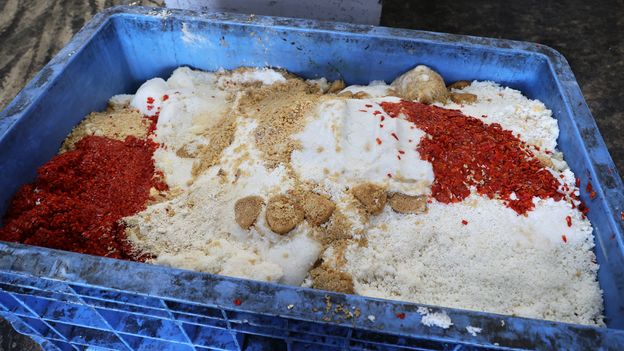…
Japan’s small size and mountainous terrain present challenges for food self-sufficiency. The country imports almost two-thirds of its food and three-quarters of its livestock feed. Yet each year, Japan throws out 28.4 million tonnes of food – much of it edible.
This comes with steep environmental and economic costs. Compared to many countries, consumers in Japan pay higher prices for food because so much of it is imported. And they also pay taxes to cover the majority of the 800bn yen (£4.2bn/$5.4bn) the country spends each year on waste incineration. Food makes up about 40% of the rubbish that Japan incinerates, and incineration produces significant air pollution and greenhouse gas emissions.
As the world’s fifth-largest emitter of greenhouse gases, Japan has set goals of cutting emissions by 46% by 2030 and becoming fully carbon neutral by 2050. Tackling food wastewill have to be a part of those efforts, Takahashi says.
Feeding food scraps to pigs, what a novel idea!
Wouldn’t the pigs get sick?
Unlikely, pigs are omnivores, their stomachs are iron
Humans are also omnivores though, pigs must be different in another important way
True, but humans are like the shittiest omnivores. They need to cook their food to digest it properly. Pigs have no such weakness, they root around in the dirt and eat whatever they find with no issue.
Other than the cooking thing, which is more us understanding it’s better for us than a hard requirement, humans are actually amazing omnivores. Dogs and wolves are some of our closest competitors there and we’re still miles ahead.
Okay, but are we amazing in that we can eat almost anything that is clean and fresh, or that we can handle unclean things filled with bacteria/ other unpleasantness?
My impression is that it’s the first, we can have a very varied diet unlike most other animals who are a bit more specialised (or in some cases very specialised), but my dog regularly eats things that would turn my stomach inside out.
deleted by creator
The county I live in (Northern California) requires that household food waste go into the curbside compost bin, or home compost. They do random checks to make sure you haven’t put any food in the landfill bin and you can get a fine.
It gets turned into compost for landscaping, along with the yard waste, not food though.
deleted by creator
That is neat! But since it charges you to put things in, wouldn’t that encourage people to just throw their food in the trash? Or is that discouraged somehow?
When I lived in Seoul, stores sold different colored bags on behalf of the city for every type of waste disposal. They will only pick up the official bags and they were transparent-ish so it was easy for them to see whether you were breaking the bag type rules.
So, even if these receptacles charge money, I expect it would be cheaper than regular trash.
Interesting! Does the curbside program bill you by weight as well? That sounds labor intensive, compared to here where you just rent the $small, $$medium or $$$large bin and pay quarterly regardless of use. And recycling and composting are free.
deleted by creator
BBC News - News Source Context (Click to view Full Report)
Information for BBC News:
MBFC: Left-Center - Credibility: High - Factual Reporting: High - United Kingdom
Wikipedia about this sourceSearch topics on Ground.News
https://www.bbc.com/future/article/20240816-the-japanese-farms-recycling-waste-food




